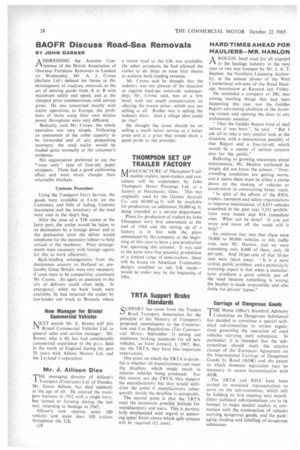BAOFR Discuss Road-Sea Removals
Page 30

If you've noticed an error in this article please click here to report it so we can fix it.
BY JOHN DARKER
A DDRESSING the Autumn Conference of the British Association of Overseas Furniture Removers in London on Wednesday, Mr. A. J. Crowe (Bullens Ltd.) defined his theme in the development of road/sea removals as the art of moving goods from A to B with maximum safety and speed, and at the cheapest price commensurate with service given. He was concerned mainly with trailer operations to Europe: the problems of those using their own motive power throughout were very different. Basically, said Mr. Crowe. the whole operation was very simple. Following an assessment of the cubic capacity to be forwarded and of any prepacking necessary, the road trailer would be loaded quite normally at the customer's residence.
His organization preferred to use the "once only' type of four-ply paper wrappers. These had a good cushioning effect and were much cheaper than returnable blankets.
Customs Procedure Using the Transport Ferry Service. the goods were available at It a.m. on the Continent, and bills of lading, Customs documents and the inventory of the load went over in the ship's bag.
After the issue of a TIR carnet at the ferry port. the trailer would be taken to its destination by a foreign driver and at the destination town the driver would telephone for the necessary labour to help unload at the residence. Prior arrangements were necessary with foreign agents for this to work effectively.
Back-loading arrangements from the destination country to Holland or. preferably Great Britain, were very necessary if costs were to be competitive, continued Mr. Crowe. An agent or associate in the city of delivery could often help. In emergency, when no back loads were available, he had returned the trailer by low-loader rail truck to Brussels. where New Manager for Bristol Commercial Vehicles
NEXT month Mr. E, Brown will join Bristol Commercial Vehicles Ltd. as general sales and service manager. Mr. Brown, who is 40, has had considerable commercial experience in the p.s.v. field in the north of England during the past 20 years with Albion Motors Ltd. and the Lefland Corporation.
Mr. J. Allison Dies THE managing director of Allison's Transport (Contracts) Ltd. of Dundee. Mr. James Allison, has died suddenly at the age of 60. He entered the transport business in 1932 with a single lorry. but turned to farming during the last war, returning to haulage in 1947.
Allison's now operate some 180 vehicles and more than 100 trailers throughout the UK.
A28
a return load to the UK was available. On other occasions, he had allowed the trailer to do three or even four shunts to achieve back-loading revenue.
Mr. Crowe said he thought that the industry was not abreast of the situation as regards road/sea removals; salesmanship, Mr. Crowe said, was at a low level, with too much concentration on offering the lowest price—which was not selling at all. Rather was it selling the industry short. And a village idiot could do that!
He thought the stress should be on selling a much better service at a better price and at a price that would show a good profit to the provider.
THOMPSON SET UP TRAILER FACTORY
hAANU FACTU RE of Thompson-TrailIV1 mobile trailers, semi-trailers and containers will be undertaken by John Thompson Motor Pressings Ltd. at a factory at Hucclecote. Glos. This was originally used by the Gloster Aircraft Co. and 40.000 sq. ft. will be available for production, an additional 30.000 sq. ft. being intended as a service department.
Plans for production of trailers by John Thompson were first announced at the end of 1964 and the setting up of a factory is in line with the plans announced by the company at the beginning of this year to have a pre-production line operating this autumn. It was said at the same time that quantity production of a limited range of semi-trailers– -these will be based on American Trailmobile designs modified to suit UK needs— would be under way by the beginning of 1966.
TRTA Support Brake Standards QUPPORT has come from the Traders ki Road Transport Association for the principle of the Ministry of Transport's proposed amendments to the Construction and Use Regulations (The Commer(ial Motor, September 3) setting out minimum braking standards for all new vehicles, as from January 1, 1967. But, say the TRTA. they have two important reservations.
One point on which the TRTA is doubtful is whether all manufacturers can meet the deadline, which might result in inferior vehicles being produced. For this reason, say the TRTA, they support the manufacturers; but they would withdraw the point if manufacturers subsequently decide the deadline is acceptable.
The second point is that the TRTA want the maximum possible latitude for manufacturers and users. This is particularly emphasized with regard to removing upper limits above which split systems will be required (12 tons).
















































































































